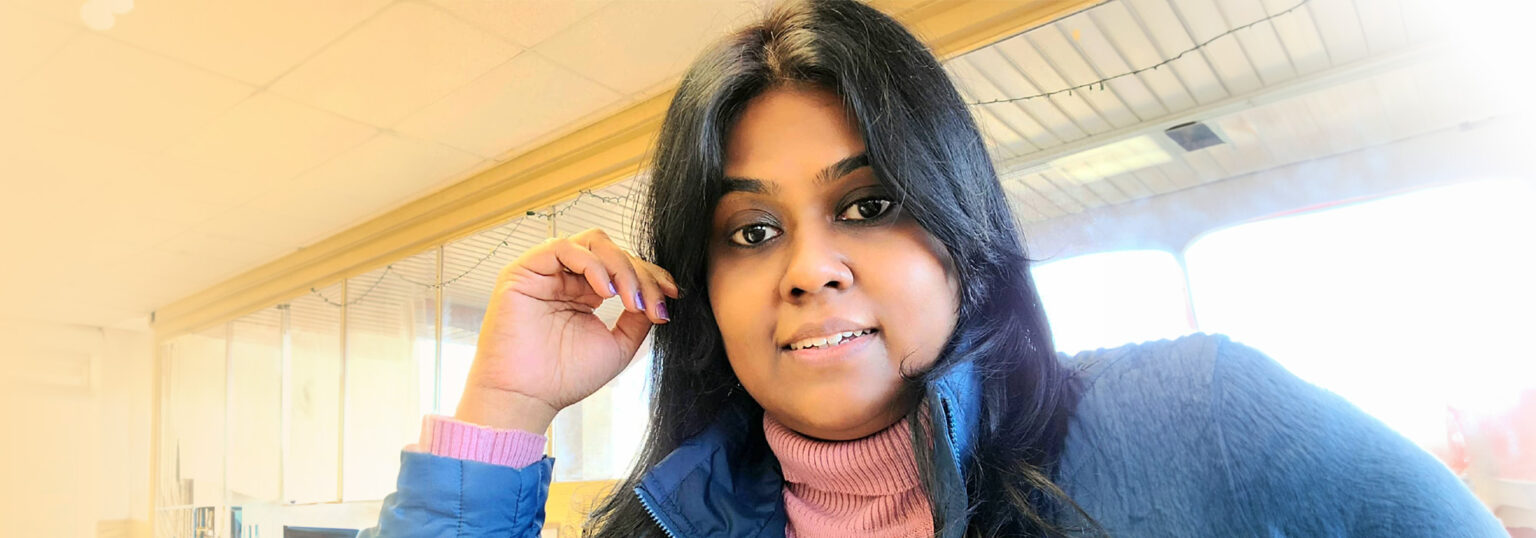Faculty Spotlight – Pooja Shrivastava
April 12, 2024 2024-12-16 10:03
Faculty Spotlight – Pooja Shrivastava
by Michael Mahaffey
Pooja Shrivastava is a faculty member at the OU College of Professional and Continuing Studies. She leads the college’s integrative studies degree completion program. She joined OU in 2016.
How long have you worked for PACS/been teaching?
I’ve worked for PACS teaching adult learners for the past eight years. I have taught undergraduate and graduate courses in business administration, healthcare administration, human and health service administration, organizational leadership, psychology and integrative studies courses throughout my career.
In my current role, I’m an associate professor and program lead for the integrative studies adult degree completion program, where I teach interdisciplinary courses to online adult learners.
Tell us a little more about your education, professional background and experience, as well as what you do outside of teaching for PACS.
I completed my MBA in 2000. I obtained a Ph.D. in Organizational Behavior and Human Resources with an emphasis on business ethics from the Indian Institute of Technology. My MBA specializes in the overlap between human resources and organizational behavior. That overlap is my favorite to explore because it plays a key role in reinforcing, developing and changing an organization’s culture, and it deals with human psychology, and that’s so intriguing. My research interests center on organizational culture, positive leadership, social connection and workplace productivity optimization. These areas of study represent a steadfast commitment to developing harmonious and successful environments.
Throughout my professional career, I have coordinated and directed advanced-level programs while also actively teaching and mentoring. I am a certified executive coach for leadership development. While working in the industry, I implemented quality assurance programs, and I have provided leadership development coaching to industry leaders using my executive coaching. This includes various activities and strategies to identify, nurture and empower individuals to help people develop essential leadership competencies, such as team building, decision-making, emotional intelligence, problem-solving and strategic thinking.
I have been a certified meditation teacher for the past 16 years. Outside of teaching in the integrative studies program, I volunteer with LiveWell OU to teach 20-minute guided meditations, “Happiness Reconnect,” on Zoom on Tuesday and Friday each week, as well as weekend-long SKY Happiness Retreats with Dr. Dinesh Nath. I think stress-free leaders create a harmonious work culture and workforce. With my management background and meditation skills, I have been recognized by the university and invited to speak at other universities to bridge the factors between time management and meditation for students and leaders.
My entire work experience has uniquely prepared me to facilitate holistic learning journeys for my students. I believe in integrating knowledge and insights from different domains. I aim to inspire students to approach learning with curiosity, creativity and critical thinking. As an integrative program lead, I am committed to directing students on a transformative educational journey that empowers them to navigate the complexities of our interconnected world and imparts confidence and an insightful educational experience.
What is your favorite thing about being an instructor at OU?
Being a faculty member or a teacher is a work of service where you get to share yourself and your knowledge with others. I like teaching and mentoring students. As a faculty member, I get to nurture future leaders. To be a future leader, you must be a leader of your own life first, and integrative studies provide that option to adult learners. With the help of advisors, students can choose courses to complete their degree that puts them in charge of their education.
To be an active teacher of adult learners, it’s crucial to stay updated with the latest ideas, research and market trends. Utilizing teaching techniques to deliver course material and assessments can help motivate and engage adult learners. I make sure to keep a close eye on the most recent developments in research and market trends.
What is your favorite course to teach?
I like to work on leadership development courses. In the past, I’ve worked on courses related to organizational behavior, such as organizational culture, business communication, ethics in leadership, group dynamics and organizational psychology. My main interest is in organizational behavior. I’m increasingly interested in exploring human behavior. Our behavior and thinking are complex and multifaceted, consisting of many layers and various aspects. We explore ourselves each day. In the same way, it’s very interesting to explore group dynamics, how people work in a team and conflicts.
Is there a student or class that has influenced you or impacted your life in any way?
Always. Teaching adult learners inspires them to be adaptable and flexible. Adults face many challenges because they are multitaskers and do multiple things in their lives. They have influenced me to be more enthusiastic and creative in my approach to teaching. We need to provide students with skills and hope, particularly with adult learners, so they march toward a bright future.
As an educator, I value imparting knowledge and recognizing the unique needs of each student in the class through my interactions with them. I constantly improve my teaching methods, adapting to different learning styles and promoting an atmosphere of learning in the classroom. I am sensitive to their needs by navigating course design and being available to serve them. I am firm in my approach to online etiquette and discipline.
What advice do you have for adult students returning to school?
Be flexible and adapt. You can do it! Do not underestimate yourself. Your willingness to learn is the key here. The coursework provides you with valuable knowledge that can be applied to real-world scenarios and your workplace. As your instructor, I’m here to support your learning process.
What is your favorite thing about teaching adults?
Adult classrooms provide a wealth of life experiences that students can share from their work and personal lives. The online classroom environment becomes dynamic and engaging when students share their experiences while learning new concepts.
Creating such a rich classroom environment is a two-way process. I interact with my students through discussion boards. It’s interesting how students from different backgrounds perceive the same theoretical framework in unique ways. One may be a military veteran, and another may be a CEO, an entrepreneur or even a professional athlete. When these individuals share their experiences, it makes for a dynamic and engaging learning environment. Each online course brings its unique flavor.
What are the opportunities that come with teaching courses online?
In an asynchronous environment where study materials can be self-paced, but assignment deadlines still exist, an individual can be a student and a professional at the same time. PACS courses are designed with busy schedules in mind, providing the flexibility one needs to study at the times most convenient to one. And you can still remain in touch with your professor.
I create interactions through my emails, announcements in the course and being available when they need to interact if they are facing any problems. Adult learners are occupied with their jobs, double-shift jobs, parenting, sometimes they are frequent flyers, etc. They could be anybody with too much on their plate. Our self-paced courses help them prioritize learning and growth to navigate the school journey successfully. Teaching online offers the opportunity to touch the entire globe.
What kind of experience do you want students to have in your courses?
Overall, I aim to create an engaging learning environment where students feel motivated by course content, their peers and me. I include various strategies that cater to different learning styles, so all students can learn in a way that suits their learning style. I establish a clear communication channel through discussion boards and announcements. I leverage established academic and professional resources like textbooks or e-books, online courses such as LinkedIn Learning, videos, inspiring recordings, etc. The alignment of course-specific goals and student learning outcomes helps the activities with instructional methodologies. I include peer assessments, low-stakes assessments (weekly assignments) and high-stakes assessments (scaffolding assignments), etc., to enhance the learning process. Assignments typically involve using a rubric for evaluation and feedback.
What do you do in your courses to encourage students to engage with you and each other? How important is it that they develop a sense of camaraderie/community with each other?
I aim to create an inspiring learning environment through practical assignments that challenge students to apply their acquired knowledge. I do that through assignments like discussion boards, case studies, in-box exercises, role-playing, video presentations or readings, to name a few. I engross them, inspiring them to synthesize study materials to make sound decisions and inculcate effectiveness and results.
I emphasize the importance of cooperation, collaboration and teamwork (C-C-T) in my classroom. I encourage my students to work together, assist each other and elevate their peers. I believe that learning how to coexist and cooperate is essential for success in group learning and teamwork, which are skills that will benefit them in their future workplace.
OU Online loves to showcase the exceptional instructors who teach our online master’s and bachelor’s degree courses. If you know an instructor who would make an interesting feature, please email us at online@ou.edu.
Faculty Spotlight – Pooja Shrivastava
April 12, 2024 2024-12-16 10:03Search
Categories


